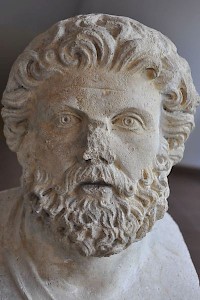Philip II of Macedonia (2)
Philip II (*382): king of Macedonia (r.360-336), responsible for the modernization of his kingdom and its expansion into Greece, father of Alexander the Great.

In 356, Philip was invited to become the protector of a city named Crenides, east of Amphipolis. Accepting it would almost certainly create problems with the Thracians (and indeed, Athenian diplomats were able to unite three Thracian leaders against Macedonia), but on the other hand, control of this rich agricultural town would give the Macedonian king access to the Pangaeon mountains, which were rich in precious ores. So, he accepted what was offered, and the city received a new name: Philippi. The mines were exploited with new techniques, offering Philip an additional yearly income of about 1,000 talents.
Until then, the Macedonian king had been nothing more or less than the foremost Macedonian aristocrat. From now on, however, he exceeded his equals in wealth, and Philip could start to create a new type of society. It was no longer an archaic state ruled by noblemen who accepted one of them as "first among equals", more or less like the aristocrats in Homer's Iliad; instead, Macedonia was to become a full-blown monarchy, not unlike the Achaemenid Empire. Philip copied several Persian institutions, like the office of spasaka (or episkopos; a man who controlled the towns on behalf of the king), and the royal pages (the sons of the noblemen, who received an education at court and guaranteed, as hostages, their fathers' conduct). Like the Persian king, Philip had the money to buy whatever he needed.
Meanwhile, the Athenians still tried to get back Amphipolis, and because they were involved in the Social war, they left the fighting to their allies, the Thracian Cetriporis, the Paeonian Lyppeius, and the Illyrian Grabus. The continued Athenian interest in the northern part of the Aegean, however, created distrust in the Greek cities. Olynthus was the first to ally itself to Philip; in return, he captured Potidaea and handed it over to the Olynthians. The terms of the treaty are not entirely clear, but it is likely that the Macedonians were permitted free use of the Potidaean ports. The Athenian garrison that had defended the city was sent back home safely: in this way, Philip opened the way towards reconciliation.
In the same summer, Philip's wife Olympias gave birth to a son who was called Alexander, and his wife Philina became mother of Arridaeus. More or less at the same time, one of Philip's commanders, Parmenion, defeated the pro-Athenian Illyrian leader Grabus in a great battle, and one of Philip's horses won a course during the Olympic Games. If we are to believe the philosopher Plutarch of Chaeronea, Philip heard the news about the birth of Alexander and that of the victories of Parmenion and the race-horse on the very day of his capture of Potidaea. This is probably not true, but the summer of 356 was remarkable. Later, Philip was recognized as king - no longer was he just a regent, but the real ruler, with the right to be succeeded by one of his own sons. Thus ended one of the most spectacular years in Philip's spectacular career.
Next year, he started to besiege Methone, a port that was situated north of Pydna. Because the Social War was in its final stages, the Athenians were unable to offer help, and the city fell in 354. During the siege, Philip lost an eye.